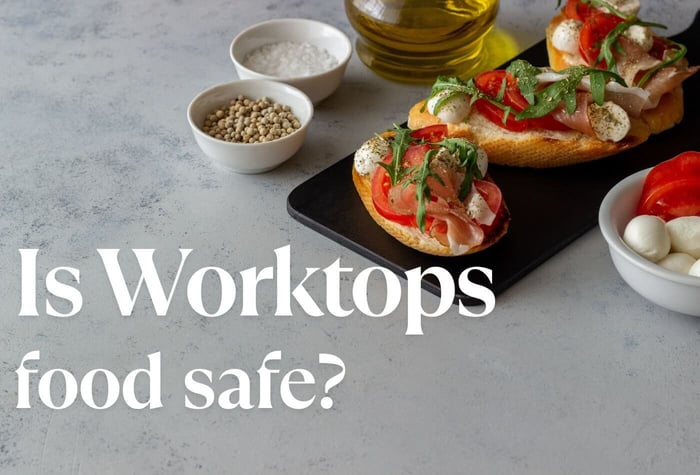Table of Contents
- Safe Worktops for Kitchen | Let’s Decode the Word 'Food Safe'
- Best Worktops for Food Safety in 2025
- Best Food-Safe Stone Worktop Materials
- Which Worktops Are Unsafe?
- How to Avoid Microparticles in Food: What Not to Do?
- Tips to Keep Your Kitchen Worktop Food Safe
- Order Safest Kitchen Worktops Available in the UK
- Final Thoughts: Is Worktops Food Safe?
- Frequently Asked Questions and Answers
What if I told you that you've been consuming toxic microparticles all this while? Have you given it a thought? Is Worktops Food Safe?
Every time I come across people deciding on the “best” kitchen worktop for their home, I hear about colour, durability and cost. Hardly have I heard anyone mention food-safe worktops as one of their research concerns. Don’t you think this is one crucial question that often gets overlooked? Is your choice of worktops safe for food?
When we are preparing meals, chopping vegetables or letting our kids help out in the kitchen, there’s one thing that we must never compromise on. And that’s food safety on work surfaces. It is absolutely non-negotiable! So today, let's break down some points around these less talked-about but important things to consider when making a kitchen purchase. We will cover what makes a worktop food-safe, which materials pass the hygiene test, and how to keep our countertops clean and safe for our family.
Stay tuned till the end to discover which material is worktops food safe.
Safe Worktops for Kitchen | Let’s Decode the Word 'Food Safe'
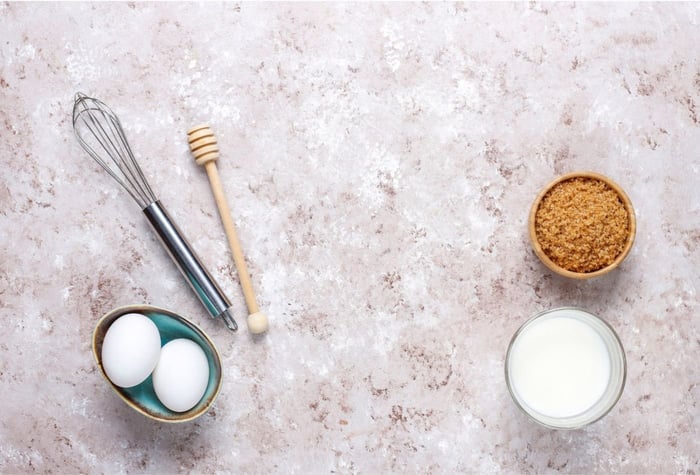
A food-safe worktop simply means that it is hygienic and does not pose a risk to our health in the long term. A kitchen counter that is trustworthy and completely safe to use for food preparation. Every food-safe worktop must tick the below points:
Non-porous surface – doesn't absorb water or food particles.
Easy to clean – smooth surface that resists stains.
Bacteria-resistant – doesn't allow germs to linger.
Chemical-free – doesn't release toxins or substances into food.
When choosing a worktop safe for food, you’re not just buying a surface. You’re investing in health, hygiene, and peace of mind.
Help Me Pick The Safest Kitchen Worktops
Best Worktops for Food Safety in 2025
If you’re still questioning is worktops food safe while starting a kitchen renovation or replacing an old counter, here are our top picks from Work-tops for 2025:
Quartz – low maintenance, hygienic, stylish.
Silestone – antimicrobial, zero sealing, modern.
Dekton – super strong, heatproof, and safe for food.
All three are non-porous, ultra-durable, and designed for modern homes, thus making your worktops an extremely safe and hygienic choice for food preparation.
Contact Us for Best Kitchen Worktops in the UK
SNOWY IBIZA SILESTONE
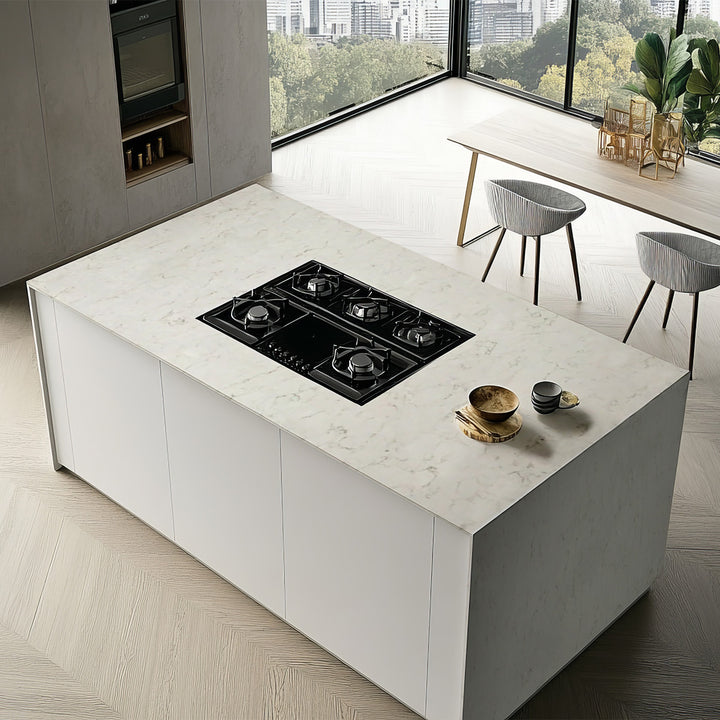
£927.46
£977.46
Snowy Ibiza Silestone is a stunning & rich white Quartz surface featuring subtle grey veining, the best & right one to enhance both contemporary & traditional interiors. Comes in thicknesses of 20mm and 30mm, this surface gives versatility for various… read more
Best Food-Safe Stone Worktop Materials
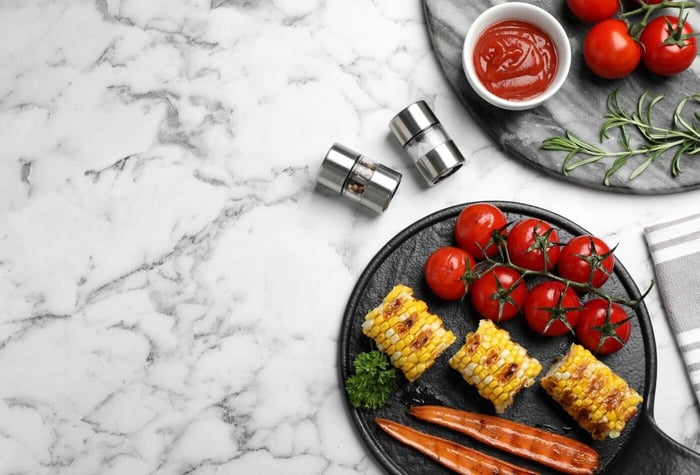
Let’s explore which stone worktops are truly safe worktops for kitchens — all of which are available at Work-tops.com.
1. Quartz Worktops
Engineered quartz is a top choice when it comes to food-safe counters, and here is why:
It does not absorb any type of liquid or food spills because it is highly non-porous.
It is resistant to scratches & stains that are a regular part of a kitchen.
It does not need additional sealing.
It is one of the easiest materials to keep clean (perfect for busy families or those with children).
All the above points thus make quartz worktops highly hygienic and ideal for direct food prep, making it perfect for every household.
2. Granite Worktops
Granite is another popular stone, but is it food safe? The answer is yes — if sealed properly.
Natural stone with high durability
Needs sealing to block pores. Once the pores get blocked or sealed, granite worktops also become stain- and bacteria-resistant.
3. Quartzite Worktops
Often mistaken for quartz, quartzite is a natural stone and very durable:
Heat and scratch-resistant.
Porous, so sealing is required.
Once sealed, it’s safe for food preparation.
For those who love the natural patterns of stone with the strength to match, quartzite is a solid option.
Check Out Quartzite Collection
4. Silestone Worktops
Silestone is a premium brand of engineered stone made primarily from quartz, and it is proven to be highly non-porous and more hygienic than the regular quartz available in the market. It also doesn't require extra sealing.
The main reason behind it is treated with antimicrobial agents, which do not allow the surface to harbour bacteria. This makes them one of the most food-safe counters on the market.
Buy Silestone Worktops for Food Safety
6. Dekton Worktops
Dekton is a high-tech material made through sintered particle technology. These worktops are manufactured to be ultra-compact, dense and highly non-porous, thus making them undeniably resistant to scratches, stains, and heat
Needs no sealing
It’s one of the best low-maintenance and food-safe surfaces available. Great for modern kitchens.
Explore Dekton Worktop Collection
7. Terrazzo Worktops
Terrazzo is made from a mix of marble chips and resin or concrete:
Requires sealing to remain hygienic.
Durable and stylish.
Once sealed, it’s suitable for food contact.
It’s rising in popularity for people who want a bold, unique design in their
Kitchen.
Understanding what to avoid is just as important:
Cracks or chips – can harbour bacteria.
Porous materials left unsealed – absorb liquids, promoting mould growth.
Worn-out sealing – needs regular resealing.
Heavy use without proper cleaning.
Even the best material can become unsafe without the right maintenance.
Next read: What Colour Worktops are Best?
Which Worktops Are Unsafe?
While most stone surfaces, especially when sealed, are safe for food preparation, there are some points that pose health risks when neglected and thus demand extra caution. Those are:
Unsealed porous materials like raw wood, untreated concrete, or unsealed natural stone have open pores. As a result, moisture can easily be trapped in them, which allows them to harbour bacteria deep within, making it unhygienic.
Plastic laminate worktops that are common in rental homes due to their cheapness also pose a similar threat. Those surfaces wear down sooner, allowing water and food bits to seep into cracks.
Another hazardous case can be old and damaged countertops. These damaged surfaces have cracks, cuts, and chipped areas, which become a vent for the entry of harmful microorganisms.
So, regardless of the material type, any surface with unsealed open pores easily traps bacteria and makes the food counter unhygienic, toxic and harmful in the long run.
If you're slicing apples where bacteria from last week's curry still lingers—that's a no-go.
Share My Sizes, Get a Free Quote
How to Avoid Microparticles in Food: What Not to Do?
Eating clean doesn’t just mean choosing the right ingredients—it also means keeping micro-debris off your plate. Here’s how to stay alert:
Avoid cutting directly on your worktop – always use a chopping board. Stone or laminate can shed tiny particles when scratched.
Check for seal wear – If your stone surface is porous, make sure it’s sealed. When you notice that water is not forming beads on the surface, make a note that it is time to reseal.
Do not use harsh scrubbing pads – they create micro-scratches on the surface, and over time those scratches turn into tiny holes that trap food particles, which decay over time and eventually lead to the growth of unwanted, toxic microbes, which again go unnoticed to the naked eye.
Say no to DIY countertop paints or kits. While you may be creative and save some cash short-term, not all kinds qualify for the food-grade test, posing a bigger threat to health by flaking into your food.
By keeping these tips in mind, we help you stay one step ahead of hidden hazards and answer your long-term doubt about is worktops food safe.
Tips to Keep Your Kitchen Worktop Food Safe
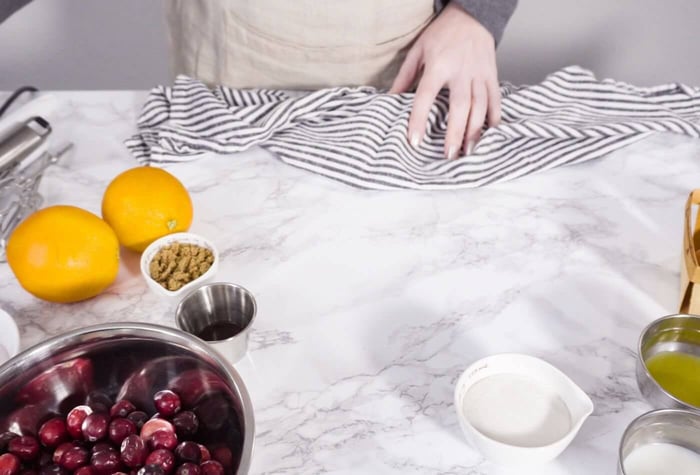
Want your worktop to stay safe for food? Here are a few easy habits:
Clean daily with mild soap and warm water.
Disinfect weekly using kitchen-safe antibacterial sprays.
Reseal stone surfaces as needed (especially granite, marble, terrazzo).
Use chopping boards to avoid scratches.
Wipe spills quickly, especially acidic ones (like lemon or vinegar).
These simple steps go a long way in keeping your kitchen hygienic.
Next read: How To Remove Turmeric Stains From Stone Counters?
Order Safest Kitchen Worktops Available in the UK
Now that you know safety in the kitchen isn't just about the additional appliances that we use. It is very important to choose the right supplier of your kitchen worktops.
Call us today at 0330 113 5868 or send your details here to get a free quote for the safest kitchen worktops available in the UK.
Final Thoughts: Is Worktops Food Safe?
So, is worktops food safe? The answer is, it depends on how well you take care of your material. Stone worktops can absolutely be safe worktops for kitchens if you choose wisely and maintain them by using chopping boards for prepping food, resealing regularly and avoiding harsh cleaners on the surface.
Need help choosing the right surface? Browse our range at Work-tops.com or speak to our expert team.
Let your kitchen be more than beautiful; let it be safe, smart, and truly clean.
You can email info@work-tops.com today to connect with experts or just dial 0330 113 5868 for an instant discussion.
Frequently Asked Questions and Answers
1. Are Quartz Worktops Safe to Use?
Is worktops food safe? Big yes from us! Quartz worktops are non-porous, making them one of the most hygienic and food-safe options available in the market today.
2. Are Granite Worktops Safe for the Kitchen?
Granite worktops are one of the safest options for kitchen use. All they demand is annual sealing to block their pores, which prevents build-up of moisture and bacteria.
3. Which is the Safest Kitchen Countertop Material for Food Prep?
Is worktops food safe? Quartz, Silestone and Dekton are considered the safest kitchen worktops due to their non-porous nature. They don't allow any type of microbes to breed on the surface.
4. Can I Cut Directly On My Stone Worktop?
It’s not recommended. It is always advised to use cutting boards for chopping food. This helps to avoid scratches on the worktop and preserve the sealant, which means no loophole for the dirt to enter the worktop.
5. Are Marble Worktops Hygienic for Food Preparation?
Is worktops food safe? Especially Marble. They can be, but require more maintenance and should be sealed regularly to stay hygienic.

